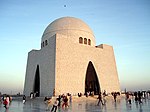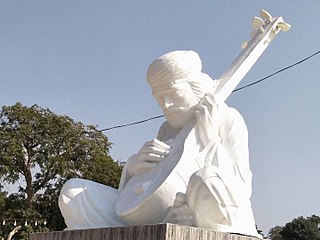
Shah Abdul Latif Bhittai, commonly known by the honorifics Lakhino Latif, Latif Ghot, Bhittai, and Bhit Jo Shah, was a Sindhi Sufi mystic and poet from Pakistan, widely considered to be the greatest poet of the Sindhi language.

Allan Fakir or Allan Faqir, was a Sindhi folk singer from Sindh, Pakistan. He was particularly known for his ecstatic style of performance, marked with devotional rhetoric and Sufi dance-singing.
Sassi Punnu or Sassui Punnhun is a folktale in the Sindhi, Balochi and Punjabi folklore. It is one of the seven popular tragic romances of Sindh. The other six are Umar Marvi, Momal Rano, Sohni Mehar, Lilan Chanesar, Sorath Rai Diyach, and Noori Jam Tamachi. In Punjab, it is four of the most popular romances. The other three are Heer Ranjha, Sohni Mahiwal and Mirza Sahiban. It also remains one of the most popular folktales in Balochistan. The story is about a faithful lover who will endure any difficulty while seeking her beloved husband who was separated from her by rivals.

The area of Karachi in Sindh, Pakistan has a natural harbor and has been used as fishing port by local fisherman belonging to Sindhi tribes since prehistory. Archaeological excavations have uncovered a period going back to Indus valley civilisation which shows the importance of the port since the Bronze Age. The port city of Banbhore was established before the Christian era which served as an important trade hub in the region, the port was recorded by various names by the Greeks such as Krokola, Morontobara port, and Barbarikon, a sea port of the Indo-Greek Bactrian kingdom and Ramya according to some Greek texts. The Arabs knew it as the port of Debal, from where Muhammad bin Qasim led his conquering force into Sindh in AD 712. Lahari Bandar or Lari Bandar succeeded Debal as a major port of the Indus; it was located close to Banbhore, in modern Karachi. The first modern port city near Manora Island was established during British colonial Raj in the late 19th century.
Umar Marvi, , is a Pakistani film adapted from a popular Sindhi folk tale, Umar Marvi, produced by Syed Hussain Ali Shah Fazlani, directed by Shaikh Hassan and starring Fazlani himself, Nighat Sultana, Noor Mohammed Charlie and Bibbo.
Gizri is one of the neighborhoods of Clifton Cantonment in the city of Karachi, Sindh, Pakistan. One of the oldest neighborhoods of Karachi was considered as Fishermen Village. There's still a small number of fisher live here who speak Bravhi & Sindhi language. Brohi Tribe is living in Gizri Since 1760 Later Came Khan of Kalat in 1949 In Gizri .. Gizri Is Famous for Baloch Tikka Wala .. Many prominent scholars and well-known writers of Pakistan live in this area including Fatima Surayya Bajia, a playwright of many popular drama serials on Pakistan Television. She was laid to rest at Gizri graveyard after she died on 10 Feb 2016 at age 85. Her younger brother Anwar Maqsood Hameedi, who also is a major TV personality in Pakistan, led the funeral arrangements and her burial. Gizri also has the headquarter of Kyokushin Karate Club and the head of it was Sir Inamullah Khan.
Hyder Bux Jatoi, 7 October 1901 – 21 May 1970) was a revolutionary, leftist, peasant leader in Sindh, Pakistan. He is known as "Baba-e-Sindh". He was also a Sindhi writer and poet. He was for many years the president of the Sindh Hari Committee, a constituent member of the National Awami Party.
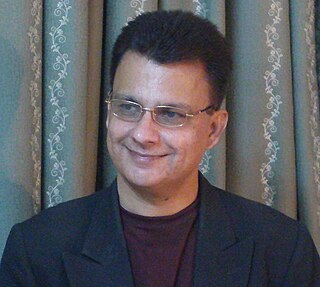
Ayaz Latif Palijo is a politician, lawyer, activist, writer and teacher. Palijo is the current president of Qomi Awami Tahreek, central convener and founder of the Sindh Progressive Nationalist Alliance (SPNA), one of the founders and central Secretary General of Grand Democratic Alliance (GDA). Since 2007, he has represented the left, objecting to the division of the southeastern Pakistan province of Sindh.
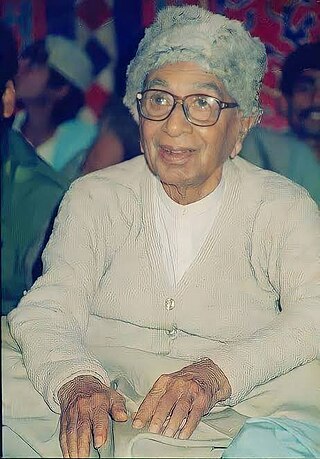
Ghulam Murtaza Syed, known as G. M. Syed was a prominent Sindhi politician, who is known for his scholarly work, passing only constitutional resolution in favor of the establishment of Pakistan from British India's Sindh Assembly in 1943. Later proposing ideological groundwork for separate Sindhi identity and laying the foundations of Sindhudesh movement. He is regarded as one of the founding fathers of modern Sindhi nationalism.
The cultural history of Karachi dates back at least five thousand years to the rise of the Indus Valley Civilization in the third millennium BC. The early culture was mostly predominantly Neolithic, characterised by the widespread use of small tools and semi-precious stones. The numerous megalithic Arab graves found around Karachi suggest significant megalithic activity from the Arabian Peninsula.
Moriro ain Mangermachh is a Sindhi folktale story about a personal valor and inventive technique by which the hero Moriro killed a sea-monster Mangermachh (Shark) by diving deep in an especially built iron cage.
Mokhi and Matara is famous story of a Barmaid, "Mokhi", who unwillingly served the poisonous "Mandh" (wine) to the Matara, eight young stout men who visited her Tavern and died after drinking heavily from the goblet. These Mataras belonged to Channa, Chauhan, Samma and Soomra tribes who were the notables of Sari in the Kohistan area of Sindh. Their tombs are still to be found at the foothill of Narathar in Gadap tehsil of Karachi.
Yasir Nawaz Baloch is a Pakistani director, producer, screenwriter, actor and former model.
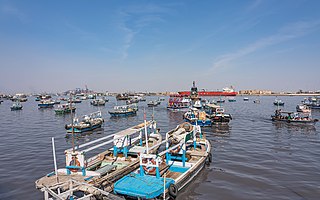
Karachi Harbour is a narrow bay and river estuary located west of the Indus River Delta in Karachi, Pakistan. The harbour lies between the Lyari River delta and Chinna Creek to the north, and the Arabian Sea to the south. Since 1886, sections of the harbour have been improved to form the Port of Karachi - Pakistan's busiest seaport.

The Consulate General of the United States in Karachi is located in the Sindh province in Pakistan and represents the interests of the United States government in Karachi, Pakistan, and nearby surrounding areas. It is the United States' largest Consulate General, and is larger, in terms of both personnel and facilities, than many U.S. Embassies. Technically a part of Mission Pakistan, and reporting through the Embassy of the United States in Islamabad.
Ustad Manzoor Ali Khan was a Pakistani singer belonging to the Gwalior gharana singing style, one of the oldest singing traditions in Hindustani classical music. Born in Shikarpur, Sindh, Pakistan, he was the first classical musician of the twentieth century who knew about the regional music of Sindh.
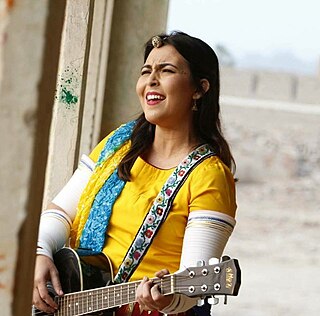
Natasha Baig, also spelled Nata-sha Baig is a Pakistani singer-songwriter from Hunza Valley. She sings in various genres including Sufi rock and had her latest hit with the Burushaski language song "Ya Maula" in collaboration with the designer Yousuf B. Qureshi.

Kaleemullah Lashari is a Pakistani archaeologist, historian and author. In March 2019, the government of Pakistan awarded him the Sitara-i-Imtiaz, the third highest honour and civilian award in Pakistan. He works to preserve the cultural heritage of Pakistan.
Atta Muhammad Bhanbhro also spelled as Atta Mohammad Bhambhro was a Pakistani writer, translator, poet, historian, lawyer, and the founder of Hoshu, a banned rebellious magazine. He wrote more than four hundred books on Sindhi literature, history including translations and civilization besides contributing to indus script through his writings. He was a wide studied man who claimed to read indus script found in moen jo daro but his research was not completed by him due to poority and government's little attention. Sometimes, he is referred to as archaeologist for his archaeological contribution excavated in Sindh.
Kamal Jamro was a professor, writer, educationist, researcher and poet. He had written various books on Sindhi literature.
